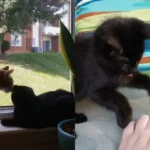Introduction
Cats are known for their cleanliness, so if your cat suddenly starts peeing outside the litter box, it’s usually a sign that something’s wrong. Understanding the reason behind this behavior is the first step toward solving it. Common causes range from medical conditions like urinary tract infections to stress and behavioral changes. Let’s look at what your cat might be trying to communicate—and how you can help.
Understanding Why Your Cat Is Peeing Outside the Litter Box
Medical Reasons to Consider
Urinary Tract Infection
UTIs can make urination painful, leading cats to avoid the litter box because they associate it with discomfort. You might notice them peeing more often in small amounts or even spotting blood in their urine. If these signs show up, a vet visit is essential for testing and treatment.
Bladder Stones
Bladder stones can be extremely painful and may block urine flow. This discomfort can cause your cat to urinate in unusual places. Diagnosis typically requires X-rays or an ultrasound, and treatment may involve a special diet or surgery.
Idiopathic Cystitis
This is a bladder inflammation without a known cause. Cats affected by it often strain to urinate and may do so around the house instead of in the box. Reducing household stress and adjusting their diet can help, but a vet should still rule out other conditions.
FLUTD (Feline Lower Urinary Tract Disease)
FLUTD refers to several urinary problems that can cause discomfort and behavioral changes. Look for signs like straining, blood in urine, or bathroom accidents. Because it can be life-threatening, prompt veterinary care is vital.
Systemic Disease
Conditions like kidney disease or diabetes increase urination and urgency. Your cat may not make it to the box in time, leading to accidents. Catching these diseases early through regular vet checkups can improve outcomes.
Behavioral Causes
Litter Box Preferences
Cats can be picky. If they dislike the litter texture or the box itself, they may choose to go elsewhere. Try experimenting with different litter types or box styles to find one your cat prefers.
Dirty Litter Box
A dirty box is a big no for most cats. If it’s not cleaned regularly, they might avoid it altogether. Scoop daily and give the entire box a thorough cleaning once a week to keep things fresh.
Old Urine Smells
Cats’ noses are incredibly sensitive. Lingering smells from past accidents can prompt repeat behavior. Use enzyme-based cleaners to remove these odors completely and discourage your cat from returning to the spot.
Stress
Big changes—like moving, a new baby, or another pet—can trigger stress-related urination. Try to keep your cat’s environment calm. Calming sprays, quiet hiding spots, and gradual changes can all help reduce anxiety.
What to Do If Your Cat Is Peeing Outside the Litter Box
Rule Out Medical Concerns
Start with a vet visit to eliminate any medical causes. Urine tests, X-rays, or bloodwork might be needed, and catching issues early can make treatment easier and more effective.
Improve Litter Box Conditions
Make sure the litter box is clean, comfy, and accessible. If you have multiple cats, consider adding more boxes in separate areas. Switching litter types or adjusting the box’s location may also help.
Reduce Stress in the Environment
Provide your cat with a peaceful, safe space. Avoid loud noises, sudden changes, or chaotic routines. Pheromone diffusers or sprays can also help calm anxious cats.
Seek Professional Help
If nothing seems to work, reach out to a feline behavior specialist. These experts can assess your cat’s habits and provide personalized advice.
Additional Considerations and Related Advice
Feline Obesity and Its Impact on Litter Habits
Extra weight can make it difficult for cats to climb into or move around the litter box. Helping your cat slim down with a healthy diet and more playtime can improve their litter habits—and overall well-being.
Aggression and Its Link to Elimination Issues
Tension with other pets can make cats feel unsafe using shared litter areas. They may start marking territory instead. Give each cat their own food and litter setup to ease competition.
Why Cat-Only Vets Can Make a Difference
Veterinarians who specialize in cats tend to be more experienced with feline behavior and health. They’re often better equipped to handle cat-specific issues with less stress for both pet and owner.
Evening Emergency Care for Cats
Some urinary issues can become emergencies fast—especially if your cat is unable to urinate. Know your nearest 24/7 vet clinic so you’re prepared in case of sudden problems.
FAQs
Why does my cat suddenly pee everywhere?
Sudden changes often mean something is wrong—either medically or emotionally. A vet can help pinpoint the cause and suggest the right solution.
How do I get rid of old urine smells?
Use enzyme-based cleaners designed for pets. These products break down the urine proteins that trigger repeat accidents.
Can stress cause my cat to pee outside the litter box?
Absolutely. Stress is one of the most common behavioral causes. Creating a calm environment can quickly reduce the problem.
When should I take my cat to the vet?
Go as soon as you notice unusual urination, especially if your cat is straining, peeing frequently, or you see blood in the urine.







GIPHY App Key not set. Please check settings